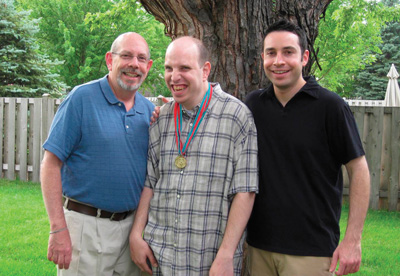Lending a hand to our brothers and sisters
Permanent link
The author (right) with his dad and brother, Mitchell.
Having a brother who is on the more severe end of the autism spectrum has profoundly shaped who I am today, both personally and professionally. It is the reason my law practice is limited to serving families of children and adults with intellectual disabilities, developmental disabilities, and mental illness.
My story, however, is not entirely unique. If you speak with siblings as often as I do, you will notice that most of us have seen our lives shaped by growing up with a brother or sister with significant special needs. Many have gone into social work, special education, or disability related fields in law or medicine. Even those who choose an unrelated field share something else deeply personal that keeps many of us awake at night: what will happen when our parents are no longer there to take care of our brothers and sisters, and it is up to us to do everything our parents have been doing for our sibling since before we can remember, or in my case, as a younger sibling, since the day I was born?
As president of Supporting Illinois Brothers and Sisters (SIBS), the state chapter of a national organization called the Sibling Leadership Network, I have worked with many bright and ambitious fellow siblings to develop a support network for our fellow brothers and sisters, to help answer the questions they have, give them insight into what their future responsibilities might be, and to support them in their unique role as a sibling.
My brother, Mitchell, has been living in a Community Integrated Living Arrangement (CILA), commonly called a group home, since he was 22 years old. It has given my sister and me tremendous piece of mind to know that he has a place he can call home with supports that allow him to live independently from my parents. While we know that someday it will be our responsibility to maintain close contact with his staff, and take him for home visits, that is vastly different than the 24/7 care that some siblings are suddenly finding themselves responsible for.
One of the greatest gifts that we, as a Jewish community, can offer siblings is "piece of mind"; by ensuring their siblings with special needs have the support they need to live and work independently from their parents. While there were few if any options for my brother, a Keshet Sunday School participant since the mid 1980s, to live in group home that was fully integrated into the Jewish community when he moved into his CILA more than 10 years ago, that is mercifully no longer the case.
Keshet, Jewish Child and Family Services (JCFS), and the Jewish Federation of Metropolitan Chicago (JUF) have come together to ensure the existence of such services and supports through the Supported Community Living Initiative (SCLI), a project I have been fortunate to be involved in from very early on in the process. The Supported Community Living Initiative explores a sustainable, community integrated future for people with developmental and intellectual disabilities. SCLI is administered by Jewish Child & Family Services, a partner in serving our community, supported by the Jewish United Fund/Jewish Federation.
The SCLI focuses on person-centered planning, to provide and/or facilitate a full array of best practices, services, and supports for adults across the spectrum of intellectual and/or developmental disabilities (IDD), as well as across all socio-economic levels and religious levels of observance. This initiative also concentrates on connecting the community to residential and supported employment opportunities that already exist through both Jewish and non-Jewish organizations. Libenu Foundation is one such organization in the Jewish community that has been a pioneer in establishing kosher CILAs in Skokie and West Rogers Park.
We have already seen residents of CILAs established under both Libenu and the SCLI attend events together including dinners and community outings. While it has not always been a smooth process, we are now seeing the young men and women in these group homes become fully integrated into their communities, they are becoming an integral part of their synagogues and local JCC's.
Knowing that our brothers and sisters are embraced by our community is immensely important to us as siblings. As it is said, kol yisrael areivim ze lazeh, all Jews are responsible for one another, may we continue to work towards the embodiment of that principal of Torah as we embark on this integral chapter in our community's service to adults with intellectual and developmental disabilities. It is ultimately a service not just to those individuals, but to their brothers and sisters as well.
For more information and updates about SCLI, visit www.jfcschicago.org/node/371. For specific inquiries email
DisabilityHelpline@jcfs.org or call (773) 467-3838.
Benji Rubin is an attorney living in Chicago. His law practice is limited to future planning for families of children with special needs.
JCFS is a partner in serving our community, supported by the Jewish United Fund/ Jewish Federation.



.jpg)



